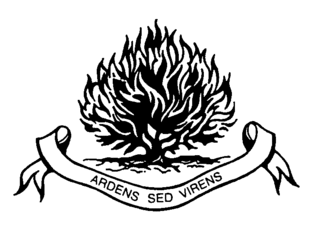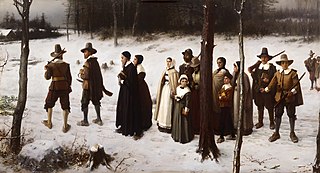Other
- Evangelical Free Church (Southbridge, Massachusetts), a historic church in that town
Evangelical Free Church can refer to the Evangelical Free Church of America, an evangelical Protestant denomination based in the United States and the Evangelical Free Church of Canada, an evangelical Protestant denomination based in Canada.
Evangelical Free Church may also refer to:

Presbyterianism is a part of the Reformed tradition within Protestantism that traces its origin to the Church of Scotland.

A Christian denomination is a distinct religious body within Christianity that comprises all church congregations of the same kind, identifiable by traits such as a name, peculiar history, organization, leadership, theological doctrine, worship style and sometimes a founder. It is a secular and neutral term, generally used to denote any established Christian church. Unlike a cult or sect, a denomination is usually seen as part of the Christian religious mainstream. Most Christian denominations self-describe as Churches, whereas some newer ones tend to use the terms churches, assemblies, fellowships, etc., interchangeably. Divisions between one group and another are defined by authority and doctrine; issues such as the nature of Jesus, the authority of apostolic succession, biblical hermeneutics, theology, ecclesiology, eschatology, and papal primacy may separate one denomination from another. Groups of denominations—often sharing broadly similar beliefs, practices, and historical ties—are sometimes known as "branches of Christianity". These branches differ in many ways, especially through differences in practices and belief.
Church of Christ may refer to:

The mainline Protestant churches are a group of Protestant denominations in the United States that contrast in history and practice with evangelical, fundamentalist, and charismatic Protestant denominations. Some make a distinction between "mainline" and "oldline", with the former referring only to denominational ties and the latter referring to church lineage, prestige and influence. However, this distinction has largely been lost to history and the terms are now nearly synonymous.

The Lutheran World Federation is a global communion of national and regional Lutheran denominations headquartered in the Ecumenical Centre in Geneva, Switzerland. The federation was founded in the Swedish city of Lund in the aftermath of the Second World War in 1947 to coordinate the activities of the many differing Lutheran churches. Since 1984, the member churches are in pulpit and altar fellowship, with common doctrine as the basis of membership and mission activity.

A united church, also called a uniting church, is a church formed from the merger or other form of church union of two or more different Protestant Christian denominations.
Evangelical Church may refer to:
United Brethren may refer to:
Conservative Christianity or Christian conservative may refer to:
Evangelical Lutheran Church can refer to many different Lutheran churches in the world. Among them are the following:
The Christian Holiness Partnership is an international organization of individuals, organizational and denominational affiliates within the holiness movement. It was founded in 1867 as the National Camp Meeting Association for Christian Holiness, later changing its name to the National Holiness Association, by which it was known until 1997, when its current name was adopted. Its stated purpose is to promote "the message of scriptural holiness" primarily through evangelistic camp meetings. The Christian Holiness Partnership is headquartered in Clinton, Tennessee.

The World Communion of Reformed Churches (WCRC) is the largest association of Calvinist churches in the world. It has 230 member denominations in 108 countries, together claiming an estimated 80 million people, thus being the fourth-largest Christian communion in the world after the Catholic Church, Eastern Orthodox Church, and the Anglican Communion. This ecumenical Christian body was formed in June 2010 by the union of the World Alliance of Reformed Churches (WARC) and the Reformed Ecumenical Council (REC).
The Evangelical Church of North America (ECNA) is a Wesleyan-Holiness, Protestant Christian denomination headquartered in Clackamas, Oregon. As of 2000, the Church had 12,475 members in 133 local churches. The Church sponsors missionaries in seven countries.

The term Eastern Protestant Christianity, encompasses a range of heterogeneous Protestant Christian denominations that developed outside of the Occident, from the latter half of the nineteenth century, and yet keeps elements of Eastern Christianity, to varying degrees. Most of these denominations came into being, when existing Protestant Churches adopted reformational variants of Orthodox Christian liturgy and worship; while others are the result of reformations of Orthodox Christian beliefs and practices, inspired by the teachings of Western Protestant missionaries. Some Eastern Protestant Churches are in communion with similar Western Protestant Churches. However, Eastern Protestant Christianity within itself, does not constitute a single communion. This is due to the diverse polities, practices, liturgies and orientations of the denominations which fall under this category.

Protestantism is a form of Christianity that originated with the 16th-century Reformation, a movement against what its followers perceived to be errors in the Catholic Church. Protestants originating in the Reformation reject the Roman Catholic doctrine of papal supremacy, but disagree among themselves regarding the number of sacraments, the real presence of Christ in the Eucharist, and matters of ecclesiastical polity and apostolic succession. They emphasize the priesthood of all believers; justification by faith alone rather than by faith with good works; the teaching that salvation comes by divine grace or "unmerited favor" only, not as something merited ; and either affirm the Bible as being the sole highest authority or primary authority for Christian doctrine, rather than being on parity with sacred tradition. The five solae of Lutheran and Reformed Christianity summarise basic theological differences in opposition to the Catholic Church.

Protestantism is the largest grouping of Christians in the United States, with its combined denominations collectively comprising about 43% of the country's population in 2019. Other estimates suggest that 48.5% of the U.S. population is Protestant. Simultaneously, this corresponds to around 20% of the world's total Protestant population. The U.S. contains the largest Protestant population of any country in the world. Baptists comprise about one-third of American Protestants. The Southern Baptist Convention is the largest single Protestant denomination in the U.S., comprising one-tenth of American Protestants. Twelve of the original Thirteen Colonies were Protestant; Maryland was the only Catholic one.
The National Union of Protestant Reformed Evangelical Churches of France, better known as the Evangelical Reformed Churches of France, is a Calvinist denomination in France. It has currently around 10,600 members spread over 68 churches, predominant in the Paris area, the southwest, and the southeast of France.